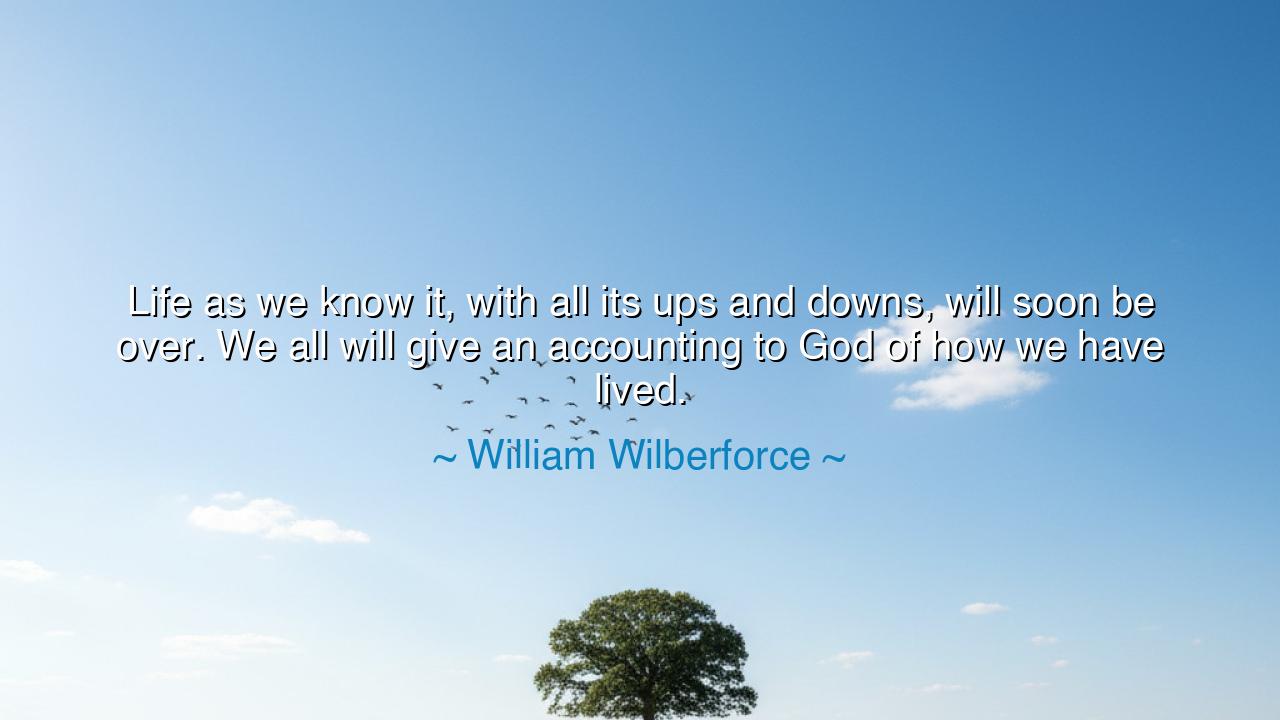
Life as we know it, with all its ups and downs, will soon be
Life as we know it, with all its ups and downs, will soon be over. We all will give an accounting to God of how we have lived.






“Life as we know it, with all its ups and downs, will soon be over. We all will give an accounting to God of how we have lived.” — Thus spoke William Wilberforce, the tireless warrior for justice, the man who broke the chains of empire by breaking first the chains of his own heart. These words, simple yet thunderous, are not the sigh of a weary soul but the trumpet call of conscience. They remind us that this mortal life, fleeting as breath, is not the end but the trial before eternity. Every joy and sorrow, every victory and failure, is but a chapter in the great story that leads to our reckoning before God, who measures not the span of our days but the truth of our deeds.
Wilberforce uttered these words not as a philosopher musing in comfort, but as a man who had labored long against the darkness of his age. Born into privilege, he might have lived a life of ease — but he was seized by conviction, pierced by the voice of conscience that whispered, “You are not your own.” He looked upon the slave ships that haunted the harbors of Britain and saw the cries of millions bound in chains. Where others saw commerce, he saw sin. Where others saw law, he saw injustice. And so he dedicated his life — his fortune, his health, his peace — to the abolition of slavery, trusting that his account before God would one day bear witness to a conscience kept faithful.
In this light, the quote reveals its origin in struggle and faith. Wilberforce knew that human life is a vapor — that all its glittering crowns and transient pleasures fade like morning dew. He had watched friends fall, seen enemies triumph, and endured ridicule from Parliament and public alike. Yet through every trial, he held fast to this truth: that earthly judgment is fleeting, but divine judgment is eternal. To him, the measure of a man was not what he gained, but what he gave; not how long he lived, but how well he loved.
The words echo the wisdom of the ancients and the prophets alike. Marcus Aurelius, the stoic emperor, spoke of the brevity of life and the duty to live rightly within it. The Book of Ecclesiastes mourns that “all is vanity,” yet calls man to fear God and keep His commandments. Wilberforce, though living centuries later, stood in that same tradition — the lineage of those who knew that mortality sharpens the moral soul. For when one remembers that life will soon be over, the petty pursuits of pride and greed lose their charm, and only righteousness remains worth striving for.
Consider how Wilberforce’s life became a living parable of his belief. For forty-six years he fought the slave trade, enduring defeat after defeat. Many told him it was hopeless — that the commerce of empire could never be undone. Yet he persevered, knowing that his duty was not to succeed, but to stand. And at last, when his body was frail and his breath short, victory came: the Slavery Abolition Act of 1833, passed three days before his death. The workman fell, but the work of God was fulfilled. He left this world ready to give his account — not as one who lived without flaw, but as one who lived with faithfulness.
Wilberforce’s words reach across time to pierce the heart of every generation. They ask us: What will you say when your days are done? What account will you give for the time, the talents, the opportunities entrusted to you? For all our achievements — our wealth, our honors, our comfort — will fade into dust. But the record of our compassion, the truth of our integrity, and the love we have sown will remain written in eternity’s book. The question is not whether we will give an account, but what that account will reveal.
Therefore, my children, let this truth be your guide: Live as one who must one day stand before the Eternal Judge, but do not live in fear — live in purpose. Let your days be filled not with idleness, but with mercy; not with vanity, but with service. Stand for justice, even when the crowd mocks you. Forgive, even when you are wronged. Use every breath as a prayer, every act as an offering. For the clock of life ticks swiftly, and each moment is a coin of eternity.
And when your hour comes — as it surely will — may you, like Wilberforce, look heavenward and say: I have fought the good fight, I have finished the course, I have kept the faith. For though God buries His workmen, He carries on His work, and every soul that has lived for truth will find its rest not in death, but in divine remembrance. So labor on, and fear not the end — for in the end, the faithful shall rise to eternal beginnings.






AAdministratorAdministrator
Welcome, honored guests. Please leave a comment, we will respond soon